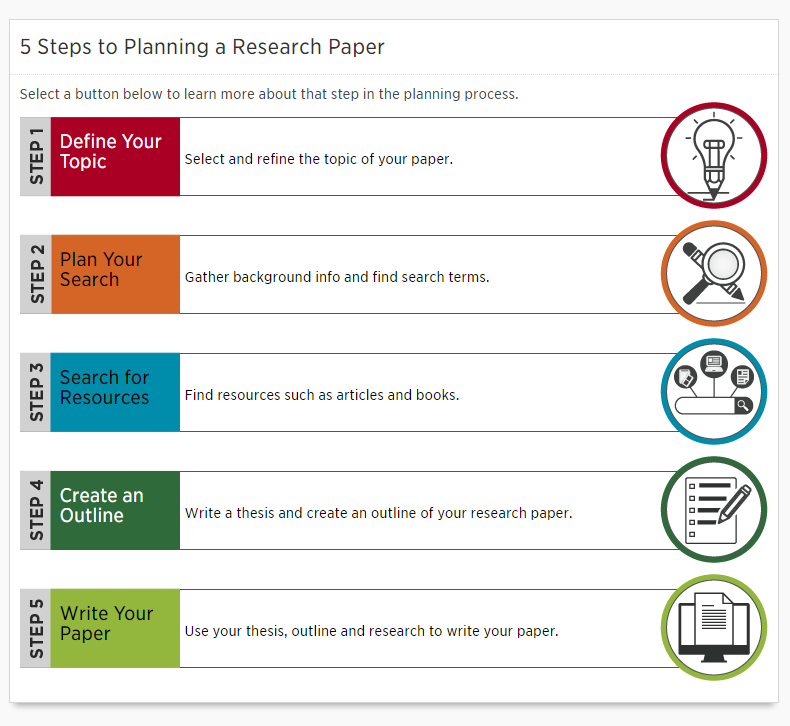Does hearing the phrase “research paper” suddenly send you into stress mode? You’re not alone! Many learners feel overwhelmed when assigned such in-depth and detailed assignments. If this is your first time writing a research paper and you’re not sure where to start, we can help make the process less intimidating. If you do have previous experience doing research, it never hurts to acquire new strategies that can help take your skills to the next level.
We believe the easiest way to tackle a large assignment is to break it down into smaller steps. Instead of attacking your research paper head on, we’ve created a plan to help guide you through each stage of the writing process:
Define Your Topic
Picking a good topic is key and can make or break the research process. So, what makes a good topic? We suggest choosing a subject that interests you and will hold your attention. Explore what information is available on that topic to ensure that you can find what you need. If a topic is too specific, you may need to expand your search; if the topic is too vague, you may need to narrow it down. Turn your topic into a question and see if you can argue or prove it. The following resources can help you with this step:
Plan your Search
Once you have spent some time gathering background information on your topic, you should have a decent grasp of some search terms that would be relevant to your subject.
- Check out the library’s Subject Guides to find resources that would make a good starting point for your research.
- Use a thesaurus to find synonyms that could help expand your search results, and make sure to record your sources as you go.
- For further help planning your search terms visit Step 2 of the Research Guide.
- Register for an upcoming Starting a Paper – Improving Your Search Strategies Workshop to learn how to produce appropriate search terms and find resources using the web and library resources.
Search for Resources
Once you have committed to your topic and know which search terms to use, you can start finding credible and relevant resources. This step will be more time consuming than the first two – just remember to take it all in stride and try not to get overwhelmed. Identify what resources are required for your assignment (type of publication, date range, how many sources you need etc.) and then search across all resources with the help of the library’s Page 1+ search tool. You can also search directly within the A-Z Database list.
For help using Page 1+, check out our related FAQ’s or book a one-on-one research appointment with Library staff. The following resources can also help:
- Explore Step 3 of our Research Guide to find tutorials, tips for search strategies and in-depth information on evaluating web resources.
- The Learning Portal’s Fake News Hub will help you to recognize common indicators of fake news, understand the consequences of careless sharing, and learn to become a fact-checker.
- Check out the Learning Portal’s How to Research module to learn more about the different types of resources and how to search through a library or on the web.
- Register for an upcoming Evaluating Resources Workshop to find out how to evaluate the quality of resources using the ‘C.R.A.A.P’ test—a guideline for critically analyzing sources—so you can avoid fake news and ensure quality research.
Create an Outline
Once you have found relevant resources, you can use these sources to begin building your argument. To start creating an outline, you want to read all the sources you have collected and take notes as you go; make sure to keep track of your sources in an organized way.
When you are ready to draft your thesis statement, remember that it needs to reflect the main argument of your paper and should only be 1-2 sentences long. It is best to outline the structure of your paper before you start writing it; this will help you to determine your main points and organize your research.
- Step 4 of our Research Guide will help you develop your thesis statement and create an effective outline of your paper.
- The Coaching Lab offers free online and on-campus (Ottawa) Coaching in the subject of writing. Coaches can help you with grammar, brainstorming and outlining, preliminary research, thesis development, formatting a paper, and more.
Write your Paper
This is the last step in the research paper writing process! At this point you should have a thesis statement, an outline, and a collection of sources and notes; everything you need to put together your research paper.
- Step 5 of our Research Guide will point you towards resources that can help structure your paragraphs, incorporate your sources, and guide you through the editing process.
- Register for any of the upcoming Research & Writing workshops to find out how to start a paper, how to find academic articles and other resources, and more.
Cite your Sources
You will be required to cite your sources. Citing is an extremely important part of the research paper writing process as it is the best way to avoid plagiarism. It provides credit to the original source, helps prove the legitimacy of your research, and gives professors the ability to find the information used in your work. Fortunately for you, there are several resources that can help you with citation:
- Check out the Citing and Documenting Sources Guide to find citation style guides and tools.
- Visit the Learning Portal’s How to Cite module for help understanding the different citation styles and for an explanation on how to cite various sources.
- Register for an upcoming Cite Right! APA Bootcamp workshop to gain hands-on experience creating references for different types of sources.
- Also check out the new AI: Generative Intelligence guide to learn more about citing AI tools in your work. Before you cite, confirm with your instructor that the use of AI tools, such as ChatGPT, are allowed for your assignment.

With so many supportive services and resources available to you, research doesn’t have to be stressful! If you have questions, please visit your campus Library in person, or contact us online via our Library Live Chat.







